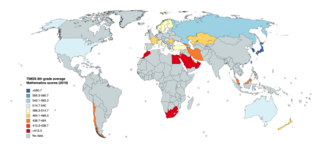This article relies largely or entirely on a single source .(April 2016) |
ETS Europe is the European arm of Educational Testing Service, an American company, involved in scholastic assessment in Europe.
This article relies largely or entirely on a single source .(April 2016) |
ETS Europe is the European arm of Educational Testing Service, an American company, involved in scholastic assessment in Europe.
It is headquartered in Utrecht in the Netherlands. ETS employs about 2,700 individuals, including 240 with doctorates and an additional 350 others with "higher degrees." Work that ETS does that is not associated with its nonprofit educational research mission is conducted by for-profit subsidiaries, such as Prometric, which administers test by computer for licensing and certification in the professional world, and ETS Global BV, which contains much of the international operations of the company.
About 25% of the work carried out by ETS is contracted by the private, not-for-profit firm, the College Board. The most popular of the College Board's tests is the SAT, taken by more than 3 million students annually. ETS also develops and administers The College Board's Advanced Placement program, which is widely used in US high schools for advanced course credit.
In England and Wales ETS Europe were contracted to operate the National Curriculum assessments on behalf of the government. ETS took over this role from Edexcel in 2008. The first year of their operation was struck by a number of problems, including the late arrival of scripts to examiners, a database of student entries being unavailable, and countrywide reports of problems with the marking of the papers. The opposition Conservative party has criticised the awarding of the contracts to ETS, and produced a dossier listing previous problems with ETS' service. Their contract with the QCA was terminated in August 2008: ETS is to pay back £19.5m and cancel invoices worth £4.6m. The UK government asked Lord Sutherland to conduct an inquiry into the failure of the 2008 tests. The report included in its main findings:
Professional certification, trade certification, or professional designation, often called simply certification or qualification, is a designation earned by a person to assure qualification to perform a job or task. Not all certifications that use post-nominal letters are an acknowledgement of educational achievement, or an agency appointed to safeguard the public interest.

A standardized test is a test that is administered and scored in a consistent, or "standard", manner. Standardized tests are designed in such a way that the questions and interpretations are consistent and are administered and scored in a predetermined, standard manner.
Test of English as a Foreign Language is a standardized test to measure the English language ability of non-native speakers wishing to enroll in English-speaking universities. The test is accepted by more than 11,000 universities and other institutions in over 190 countries and territories. TOEFL is one of several major English-language tests worldwide, including IELTS, Duolingo English Test, Cambridge Assessment English, and Trinity College London exams.

Educational Testing Service (ETS), founded in 1947, is the world's largest private nonprofit educational testing and assessment organization. It is headquartered in Lawrence Township, New Jersey, but has a Princeton address.

The College Board is an American not-for-profit organization that was formed in December 1899 as the College Entrance Examination Board (CEEB) to expand access to higher education. While the College Board is not an association of colleges, it runs a membership association of institutions, including over 6,000 schools, colleges, universities, and other educational organizations.
NOCTI delivers a battery of assessments or Standardized tests for students studying career and technical programs in high schools and technical colleges in the United States. The assessments, based on a job and task analysis process, incorporate input from subject-matter experts (SMEs) representing regions of the United States in secondary and post-secondary education as well as business and industry. The assessments are updated on a regular basis and are aligned with O*NET, national academic standards as well as business and industry standards. When appropriate, customized assessments may be developed to meet the educational needs of a specific region or a state. A number of the assessments are linked to industry certifications programs.
The Test of English for International Communication (TOEIC) is an international standardized test of English language proficiency for non-native speakers. It is intentionally designed to measure the everyday English skills of people working in an international environment.
An examination board is an organization that sets examinations, is responsible for marking them, and distributes the results. Some are run by governmental entities; some are run as not-for-profit organizations.
University of Cambridge Local Examinations Syndicate (UCLES) is a non-teaching department of the University of Cambridge, which operates under the brand name Cambridge Assessment, and is part of Cambridge University Press & Assessment. It provides educational assessments, which include the Oxford, Cambridge and RSA Examinations (OCR) examination board, Cambridge Assessment International Education, Cambridge Assessment Admissions Testing, and Cambridge Assessment English for learners of the English language.

Kaplan, Inc. is an international educational services company that provides education and training services to colleges, universities, businesses and individuals around the world. Founded in 1938 by Stanley Kaplan, the company offers a variety of test preparation, professional training, career development, language training, university and student support services. The company is headquartered in Fort Lauderdale, Florida, and is a wholly owned subsidiary of Graham Holdings Company.
The Common European Framework of Reference for Languages: Learning, Teaching, Assessment, abbreviated in English as CEFR or CEF or CEFRL, is a guideline used to describe achievements of learners of foreign languages across Europe and, increasingly, in other countries. The CEFR is also intended to make it easier for educational institutions and employers to evaluate the language qualifications of candidates for education admission or employment. Its main aim is to provide a method of learning, teaching, and assessing that applies to all languages in Europe.
Prometric, also known as Prometric Testing, is a U.S.-based company operating in the test administration industry. The corporate headquarters are located in Baltimore, Maryland, United States. The company manages a vast network of test centers, with thousands of sites in 160 countries, where various examinations are conducted, including those for India-Common Entrance Test, North American Veterinary Licensing Examination, and Secondary School Admission Test.

The National Assessment of Educational Progress (NAEP) is the largest continuing and nationally representative assessment of what U.S. students know and can do in various subjects. NAEP is a congressionally mandated project administered by the National Center for Education Statistics (NCES), within the Institute of Education Sciences (IES) of the U.S. Department of Education. The first national administration of NAEP occurred in 1969. The National Assessment Governing Board (NAGB) is an independent, bipartisan board that sets policy for NAEP and is responsible for developing the framework and test specifications.The National Assessment Governing Board, whose members are appointed by the U.S. Secretary of Education, includes governors, state legislators, local and state school officials, educators, business representatives, and members of the general public. Congress created the 26-member Governing Board in 1988.
Nancy Cole is an educational psychologist and expert on educational assessment. Cole is past president of the American Educational Research Association and the Educational Testing Service (ETS), and former Dean of Education at the University of Illinois at Urbana-Champaign. She earned her Ph.D. in psychology from the University of North Carolina. Her undergraduate education in psychology was at Rice University.

The IEA's Trends in International Mathematics and Science Study (TIMSS) is a series of international assessments of the mathematics and science knowledge of students around the world. The participating students come from a diverse set of educational systems in terms of economic development, geographical location, and population size. In each of the participating educational systems, a minimum of 4,000 to 5,000 students is evaluated. Contextual data about the conditions in which participating students learn mathematics and science are collected from the students and their teachers, their principals, and their parents via questionnaires.

Advanced Placement (AP) examinations are exams offered in United States by the College Board and are taken each May by students. The tests are the culmination of year-long Advanced Placement (AP) courses, which are typically offered at the high school level. AP exams have a multiple-choice section and a free-response section.
The Speaking Proficiency English Assessment Kit (SPEAK) is an oral test developed by the Educational Testing Service (ETS). The SPEAK test continues to be administered to non-native English speakers, though it is no longer supported by ETS. No new versions of this test exist. The test aims to evaluate the examinee's proficiency in spoken English; however, most academic institutions recognize that it is limited in that capacity, and have therefore abandoned using it. It is usually taken as a professional certification, especially for graduate teaching assistants in the American college and university system, who are often required to hold office hours and converse in English with students. It is also used in the medical profession, where communication with patients is required. The SPEAK test has been routinely criticized for not accurately testing how a speaker will perform in the real world, in part because it is administered by recording the individual speaking into a recording device rather than speaking to a person. The SPEAK test has also been criticized for using native speaker norms to judge non-native speakers. In fact, independent audits of the SPEAK test conducted in 2012 on some of the few institutions found to still administer this test revealed that the assessment standards provided by ETS were not even being used by the assessors. In fact, in some cases, the assessors of the test were not trained in any way to conduct the assessments, and were found to be assigning arbitrary grades to the candidates. Some of the raters audited were found to themselves have limited functional spoken grammar.

The A-level is a subject-based qualification conferred as part of the General Certificate of Education, as well as a school leaving qualification offered by the educational bodies in the United Kingdom and the educational authorities of British Crown dependencies to students completing secondary or pre-university education. They were introduced in England and Wales in 1951 to replace the Higher School Certificate. The A-level permits students to have potential access to university if their grade is of satisfactory quality.
Language assessment or language testing is a field of study under the umbrella of applied linguistics. Its main focus is the assessment of first, second or other language in the school, college, or university context; assessment of language use in the workplace; and assessment of language in the immigration, citizenship, and asylum contexts. The assessment may include listening, speaking, reading, writing, an integration of two or more of these skills, or other constructs of language ability. Equal weight may be placed on knowledge and proficiency, or greater weight may be given to one aspect or the other.

An examination or test is an educational assessment intended to measure a test-taker's knowledge, skill, aptitude, physical fitness, or classification in many other topics. A test may be administered verbally, on paper, on a computer, or in a predetermined area that requires a test taker to demonstrate or perform a set of skills.